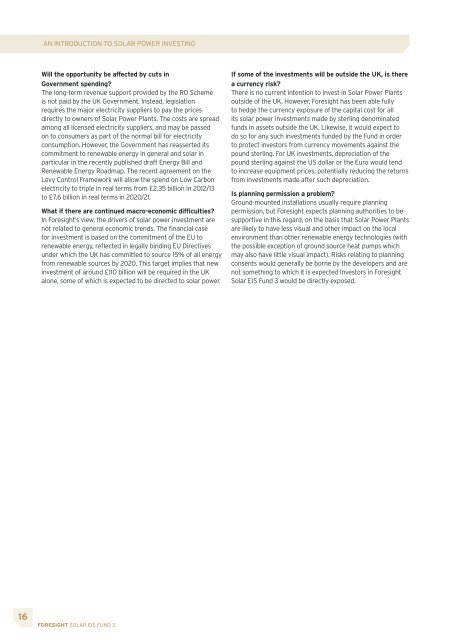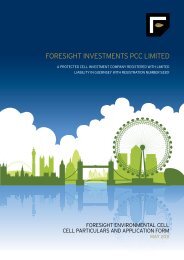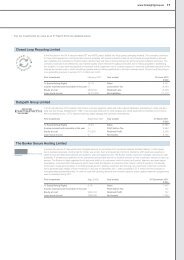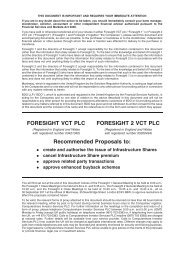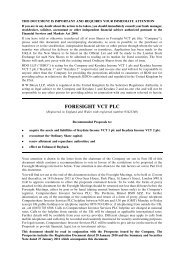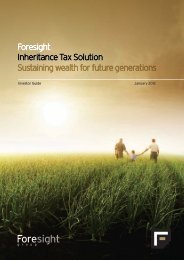Information Memorandum - Foresight Group
Information Memorandum - Foresight Group
Information Memorandum - Foresight Group
You also want an ePaper? Increase the reach of your titles
YUMPU automatically turns print PDFs into web optimized ePapers that Google loves.
AN INTRODUCTION TO SOLAR POWER INVESTING<br />
Will the opportunity be affected by cuts in<br />
Government spending?<br />
The long-term revenue support provided by the RO Scheme<br />
is not paid by the UK Government. Instead, legislation<br />
requires the major electricity suppliers to pay the prices<br />
directly to owners of Solar Power Plants. The costs are spread<br />
among all licensed electricity suppliers, and may be passed<br />
on to consumers as part of the normal bill for electricity<br />
consumption. However, the Government has reasserted its<br />
commitment to renewable energy in general and solar in<br />
particular in the recently published draft Energy Bill and<br />
Renewable Energy Roadmap. The recent agreement on the<br />
Levy Control Framework will allow the spend on Low Carbon<br />
electricity to triple in real terms from £2.35 billion in 2012/13<br />
to £7.6 billion in real terms in 2020/21.<br />
What if there are continued macro-economic difficulties?<br />
In <strong>Foresight</strong>’s view, the drivers of solar power investment are<br />
not related to general economic trends. The financial case<br />
for investment is based on the commitment of the EU to<br />
renewable energy, reflected in legally binding EU Directives<br />
under which the UK has committed to source 15% of all energy<br />
from renewable sources by 2020. This target implies that new<br />
investment of around £110 billion will be required in the UK<br />
alone, some of which is expected to be directed to solar power.<br />
16 FORESIGHT SOLAR EIS FUND 3<br />
If some of the investments will be outside the UK, is there<br />
a currency risk?<br />
There is no current intention to invest in Solar Power Plants<br />
outside of the UK. However, <strong>Foresight</strong> has been able fully<br />
to hedge the currency exposure of the capital cost for all<br />
its solar power investments made by sterling denominated<br />
funds in assets outside the UK. Likewise, it would expect to<br />
do so for any such investments funded by the Fund in order<br />
to protect investors from currency movements against the<br />
pound sterling. For UK investments, depreciation of the<br />
pound sterling against the US dollar or the Euro would tend<br />
to increase equipment prices, potentially reducing the returns<br />
from investments made after such depreciation.<br />
Is planning permission a problem?<br />
Ground-mounted installations usually require planning<br />
permission, but <strong>Foresight</strong> expects planning authorities to be<br />
supportive in this regard, on the basis that Solar Power Plants<br />
are likely to have less visual and other impact on the local<br />
environment than other renewable energy technologies (with<br />
the possible exception of ground source heat pumps which<br />
may also have little visual impact). Risks relating to planning<br />
consents would generally be borne by the developers and are<br />
not something to which it is expected Investors in <strong>Foresight</strong><br />
Solar EIS Fund 3 would be directly exposed.


